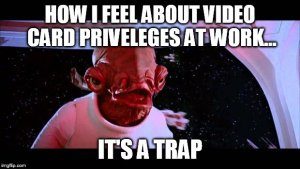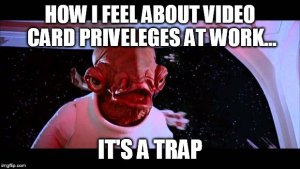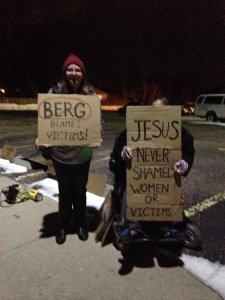Editorial Note: The following is reprinted with permission from Eleanor Skelton’s blog. It was originally published on July 2, 2015.
After leaving fundamentalism, some of my friends left organized religion because of spiritual abuse, or identified as anarchists because they’d seen systems of power oppress people.
I can’t blame them really, even if their choices appear extreme, because I don’t trust authority, either.
Authority more often uses power to control rather than to protect in my experience, not as an American citizen, but as a child growing up in an authoritarian household and evangelical churches, which I plan to write more about.
Sometimes this distrust surfaces in the workplace. I get jumpy when a supervisor comes over when I’ve done nothing against the rules, and my mind often assumes the worst if a manager asks to talk to me. I’m used to Draconian practices, harsh punishments for minor infractions.
A couple of my friends at work say I’m being paranoid, and asked me to explain how I feel.
Here are some of my ingrained responses to authoritarian systems:
1) Don’t let the authority know what your true desires are.
If the authority knows what you actually want, they gain insight into your thought processes.
Favorite books, TV shows, music, and hobbies reveal much about your personality and beliefs. For instance, I’ve started watching Supernatural this summer, because it resonates with how I think about spirituality, and how light and darkness work.
When I lived at home, if my parents knew what I liked, they could use it to punish me. They took away books I was reading, and my laptop and internet access, even during college.
And this could be for reasons like, one afternoon, Dad suddenly decides I am reading too much fiction, which isn’t productive. He says I should be studying or doing housework, so I lose my book for two weeks. Or longer. And I have to beg to get it back, which I’d do if I was caught at a cliffhanger.
This started with favorite toys.
My dad pitched my pony out the window onto the freeway because I was a crying, upset three year old, and he left my Pound Puppies on top of a supermarket trashcan when he thought I was disrespectful when I was 8.
I wasn’t a perfect child, but instead of trying to understand how I felt or why I was acting out, my parents often responded with punitive measures and emotion shaming.
I’m not sure what he was trying to teach me, but all I learned was “don’t let the authority know what you care about.”
2) Don’t accept rewards from the authority.
If the authority gives incentives, they can also take them away. It feels like another form of manipulation. I take back control when I meet the requirement and decline the offered reward.
I’m also suspicious that there’s a catch, that the authority has an ulterior motive.
I work in a call center that offers video card privileges for employees who score well on the weekly test calls. Usually, I boycott the video card.
 I explained it to my friend Shelby like this when I had been boycotting for about six weeks:
I explained it to my friend Shelby like this when I had been boycotting for about six weeks:
It is one of my forms of rebellion against the system. Sometimes I do things like this because it satisfies my need to be in control of my life, even in small things. Taking the video card feels like submission to the authority. Whenever authority is like “here’s a reward” for excellence and a punishment is associated with doing poorly, I dislike being rewarded. I feel patronized. I don’t want to be rewarded by the authority. I want to excel and have the option to refuse the reward. It’s probably from growing up in my house. Slight offenses could result in beatings, huge amounts of schoolwork had to be done. The only way I felt I could fight back was by refusing rewards. If you take away their power to reward you, they can’t emotionally control you, because then you won’t be sad if they take the reward away. It’s something that baffles the authority and something they can’t punish. This is the way I balance my desires and my paranoia, without informing the authority of my desires.
I’ve also never accepted candy bars for making honor roll at work. It feels like bribery, too similar to my dad giving me a $10 bill for completing extra sheets of math homework.
I don’t want to be tricked into compliance. I just want to do my job, a self-sufficient human who meets my own needs.
3) Act as if the authority wants to own you unless determined otherwise.
I’m used to living like Big Brother is watching.
Early advocates of homeschooling argued that the public school system groomed children to be compliant employees. It’s unfortunate that so many fundamentalist families used homeschooling to control information to fit a supposedly Biblical narrative, to create an entire generation raised according to a “Christian” formula of perfection.
Our parents believed we’d be corrupted and deceived by evil if we weren’t isolated from the rest of society. They had an agenda, and they justified their behavior by telling us they were saving our souls from eternal damnation.
Their plan? Incubate a culture-changing generation. They needed us.
And I’m wary of how other systems could also be using me.
Many friends have told me they have similar fears and even difficulties maintaining employment, because now all authority carries the threat of repressing desires and emotions, crushing their souls.
Logically, I know that not all authority is evil and abusive, not everyone is out to get me. I recognize that authority can protect me, that revolution can be deadly. I know police officers who wouldn’t shoot someone because of their race, and I get along well with college professors, because they seem like guides or mentors, not tyrants.










